Garry Kasparov - The Mercurial Chess Titan
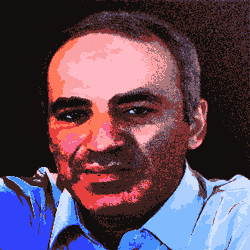
Garry Kasparov
Kasparov's meteoric rise began in the 1970s when he showed great promise in Mikhail Botvinnik's chess school. He first qualified for the USSR Championship at 15. Later he would become the youngest ever World Champion at 22 with victory over Anatoly Karpov. He would set records for the then longest ever stretch at World #1, 225 out of 228 months and 255 months in total, plus the then highest ever ELO rating at 2851.
He was also no stranger to controversy. He set up a rival World Championship following a dramatic split from FIDE. This fissure in world chess would endure for 13 years before a reunification match between Vladimir Kramnik and Veselin Topalov merged them back together.
He is now retired from top-level professional chess but still participates in simuls, exhibitions and blitz events from time to time. You can enter your own articles or annotated games on Kasparov.
Young Garry
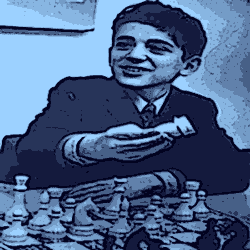
Garry Kasparov was a strong chess player at an early age
When he was 7 he began to study chess at the Young Pioneer Palace in Baku. At 10 he had progressed so well that he won a place in Mikhail Botvinnik's chess school. He lost his father to illness while still a young boy. He took his mother's surname Gasparyan and when he moved to Moscow this became Kasparov.
After winning the 1976 Soviet Junior Championship in Tbilisi, Georgia and the 1978 Sokolsky Memorial Tournament in Minsk, Belarus, Kasparov knew he would have a huge future in chess.
Early Career

Garry Kasparov won the World Junior Championship in Dortmund in 1980
He got lucky when the Russian Chess Federation accidentally invited him to a GM event in Banja Luka in 1979. He was still unrated by FIDE at this time.
He took advantage and how. He won the tournament and gained the provisional rating of 2595, suddenly making him the World #15. He built on this, winning the 1980 World Junior Chess Championship in Dortmund.
He followed up that success with his debut as 2nd reserve for the Soviet Union at the 1980 Chess Olympiad in Valletta, Malta. He became a GM at this event.
Domestic Honors

Garry Kasparov quickly established himself as a force to be reckoned with in chess
He had now qualified for the 1982 Moscow Interzonal Tournament. He won it to become the youngest qualifier for a Candidates Tournament since Bobby Fischer.
He was now the World #2 chess player. Only the World Champion Anatoly Karpov was ranked above him. He needed to win the Candidates Tournament to get a shot at Karpov's title.
Kasparov the Candidate
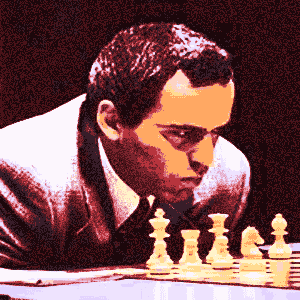
Garry Kasparov won the Candidates Tournament at the first attempt
He was to play against Viktor Korchnoi in the Semi-final. There were complications however as Korchnoi had defected from the USSR. The political wrangling between Korchnoi and the Soviets meant that Kasparov could not play the match and had to forfeit. Korchnoi eventually agreed to reschedule at short notice and the match went ahead. Kasparov won it +4-1=6.
Vasily Smyslov, who had been World Champion a quarter of a century earlier, was rolling back the years and had also reached the Final. But there was to be no fairy tale return to glory for Smyslov. Kasparov crushed him +4-0=9 to set up a World Championship clash against Karpov.
Kasparov vs Karpov

Garry Kasparov and Anatoly Karpov fought an epic 6 year battle for supremacy in the chess world
All of the matches they played would be very close, extremely tense, with the issue in doubt right up to the very last game. The level of chess played would be as high as the world had ever seen.
They would play 5 World Championship matches in total over the Kasparov-Karpov series. At the end of 144 games throughout the 5 matches, Kasparov would win 21 games, Karpov would win 19 and there would be 104 draws.
Marathon Match and Series
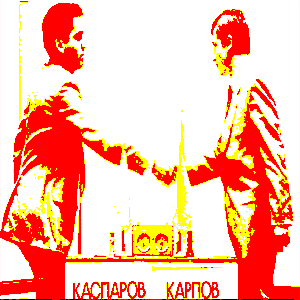
Garry Kasparov came out on top in the struggle against Anatoly Karpov but only just
FIDE returned to the old 24 game format to avoid a repeat of the Marathon Match. Kasparov won a close encounter in '85, clinching the win in the last game, +5-3=16. He had three further successful World Championship defenses against Karpov: +5-4=15 in London (1986), +4-4=16 in Seville (1987) (as champion, Kasparov retained the title) and +4-3=17 in New York and Lyon (1990).
During the Karpov Years
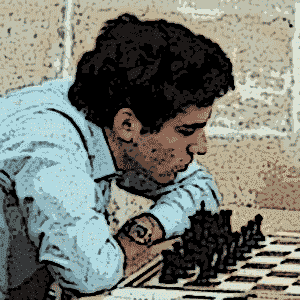
Garry Kasparov had many great achievements besides his duel with Anatoly Karpov
He won a short rapid match against Nigel Short +4-2=0. He would meet the up and coming Englishman a few years later with much more at stake.
He shared the 1988 USSR Championship with his nemesis Karpov. He would never win a USSR Championship outright although his Russian Championship victory 16 years later would not be shared.
Split From FIDE
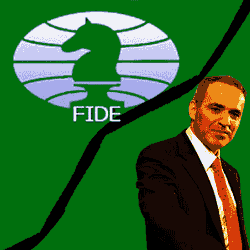
Garry Kasparov broke away from FIDE in 1993
After a warm up simul at Simpson's in the Strand, Kasparov beat Short +6-1=13 to become the first Classical World Champion. In response FIDE stripped Kasparov of the FIDE title, organizing a decider between the former champion Anatoly Karpov and Jan Timman. Karpov won the match to take the FIDE title.
Kasparov next played Vishy Anand at the World Trade Center, NYC in 1995 for the PCA World Championship. Kasparov won +4-1=13.
When the PCA went bust Kasparov set up the World Chess Council. The holder of this title like the holder of the PCA title before it would be known as the Classical World Champion.
Kasparov vs Deep Blue
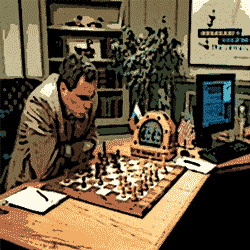
In 1997 a chess computer, Deep Blue, made history by beating a reigning human World Chess Champion in a match. Deep Blue beat Garry Kasparov 3.5 - 2.5
Hitech beat GM Arnold Denker and Chiptest's machine, Deep Thought beat serial World Championship Candidate GM Bent Larsen. Man vs Computer events were held regularly during the 90s with teams of top human players defending humanity's honor against the machines. The humans were winning at first. However slowly but surely the pendulum swung towards the computers.
The big question on everyone's lips was if or when a computer would or could ever win a match against a reigning World Champion. Kasparov smashed Deep Thought +3-1=2 in Philidelphia in 1996. A year later, Deep Thought, since renamed Deep Blue, turned the tables on Kasparov. He became the 1st World Champion to lose to a computer, +1-2=3 in New York.
Kasparov vs Kramnik
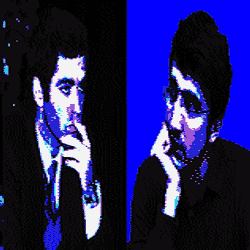
Vladimir Kramnik took the Classical World Championship from Garry Kasparov
Kramnik's style is solid and defensive. He gives nothing away and pounces on errors. In 2000 Kasparov found him an impossible opponent to deal with. As White he played his favored Ruy Lopez Opening but Kramnik neutralized it repeatedly with the Berlin Defense, managing to draw every game as Black.
As Black Kasparov fought hard but made a couple of errors along the way. Kramnik picked up wins in Games 2 and 10 to win +2-0=13. Garry Kasparov was no longer a World Champion of any description.
Final Chess Years
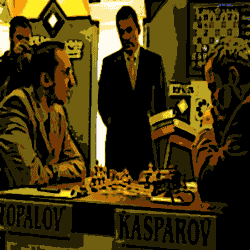
Garry Kasparov playing Veselin Topalov in his last appearance in top level professional chess
Kasparov, Kramnik and other leading chess players together with the various bodies met to hammer out a deal. This deal became known as the Prague Agreement. Kramnik would play Peter Leko for the Classical Championship. Kasparov would play the FIDE Champion Ruslan Ponomariov with the two winners facing off for the undisputed FIDE World Chess Championship.
Kasparov's matches against the FIDE champions never materialized. At this point Kasparov told FIDE he was no longer interested in trying to regain the World Championship. He retired from professional chess in 2005 while still one of the very best players around. He had won the 2004 Russian Championship outright for the first time the previous year and decided he had achieved everything there was to achieve. In his final bow, Kasparov won Linares 2005. He faced his old friend Anatoly Karpov in 2009 for a Quarter Century anniversary of their 1984 Marathon Match. He won the 2009 Blitz/Rapid encounter +8-2=2.
Legacy of Kasparov

Fancy a game with the legendary Garry Kasparov?
Some say Paul Morphy was the greatest chess player ever, some say Jose Raul Capablanca. Some say Bobby Fischer and some say Garry Kasparov. Maybe if they had lived in the 19th or 20th Centuries Philidor and La Bourdonnais would have been in the Some Say Club.
Magnus Carlsen has now become the newest member of this elite club. Kasparov is in the Some Say Club without doubt.
Quite apart from that he produced what practically became a library on chess. His best known literary contribution is My Great Predecessors, a five volume series of books on previous World Champions with Kasparov's annotations on some their most interesting games.
Share Your Garry Kasparov Anecdotes and Games
The problem with biographies is you must concentrate on breadth and can never go as deep as you would like. You can mention the major events in someone's life but can't allow yourself to indulge in intricate detail. Garry Kasparov is regarded by many as the strongest chess player in the history of the game. Away from chess he has also made his presence felt in politics and literature. There must be countless anecdotes and interesting accounts of different episodes and incidents throughout his days. Some of these accounts give us an insight into what kind of man he was, what made him tick. Or if you prefer you could annotate one of his games, reflecting his genius over the board. Do you know of an interesting story or game from his life? Share Your Garry Kasparov Anecdotes or Games With Us.
Garry Kasparov Anecdotes and Games Left by other Contributors
Click below to see Garry Kasparov Anecdotes and games by other Contributors...
Decent Man Kasparov Goes Global Not rated yet
Turning fifty in 2012, Garry Kasporov has already moved beyond his birthplace in Baku Azerbaijan (Russia) into world renown. From a young age he studied …
Kasparov Berlin Wall Not rated yet
Garry Kasparov is one of the most renowned Chess players of all the times and the most important thing is that he stated playing chess from his young age. …
Man Vs Machine Not rated yet
This remarkable game was played between Garry Kasparov and Deep Blue, designed by IBM. This game is one of the First Chess Matches of a Human against …
Moving On

Chess Grandmasters - Ruy Lopez de Segura
He will also be remembered for his infamous split with FIDE. Frictions between players and governing bodies are inevitable, no matter what sport. Kasparov himself later expressed regret that things went so far. In the end though he will always be remembered most for the amazing chess he played. He may have been the greatest.
Kasparov was also a prolific chess writer. His My Great Predecessors series was among his most famous. Following the Kasparov era, chess is as strong as ever as his great successors can testify.






